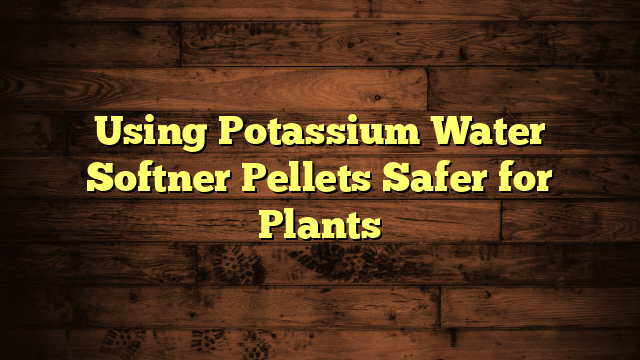Using Potassium Water Softner Pellets Safer for Plants
Did you know that the type of water softener you use can greatly impact your garden's health? By switching to potassium water softener pellets, you can not only protect your plants from harmful sodium buildup but also enhance their growth potential. This alternative offers a range of benefits you might not have considered, including better soil quality and nutrient absorption. Curious about how this simple change can lead to a thriving garden? Let's explore the advantages and practical applications that could transform your approach to gardening.
Key Takeaways
- Potassium pellets improve soil quality, enhancing nutrient uptake and supporting healthier plant growth compared to sodium-based softeners.
- They reduce sodium accumulation from hard water, promoting better root systems and moisture retention.
- Potassium enhances nutrient absorption, preventing issues like leaf discoloration and stunted growth associated with hard water.
- Minimal runoff from potassium pellets safeguards water quality, reducing risks to local ecosystems compared to traditional softeners.
- Regular use of potassium improves soil structure and supports beneficial microorganisms essential for plant health.
Understanding Water Hardness
Water hardness refers to the concentration of minerals, primarily calcium and magnesium, dissolved in your water supply. Understanding your water chemistry is vital for both household tasks and gardening.
When you analyze the mineral composition of your water, you'll discover that these minerals can affect everything from soap lathering to plant health.
Hard water can create challenges in your garden. For instance, excessive calcium and magnesium may inhibit nutrient absorption. This can lead to issues like leaf discoloration or stunted growth.
While these minerals are important for plant health in moderation, too much can disrupt the balance necessary for peak growth.
You might also notice that hard water can leave deposits on your fixtures and appliances, making maintenance more challenging. By understanding the hardness of your water, you'll be better equipped to make informed decisions about treatment options.
Using water softeners, like potassium pellets, can help reduce water hardness without negatively impacting your plants. This way, you create a healthier environment for your garden while improving the overall quality of your water.
The Role of Potassium
How does potassium contribute to plant health? Potassium plays an essential role in several key plant functions, ensuring they thrive. As one of the important macronutrients, potassium sources like potassium water softener pellets can greatly enhance soil health.
When you use these pellets, you're providing a readily available form of potassium that promotes efficient plant absorption.
Potassium helps regulate various physiological processes, including water retention and nutrient transportation within the plant. This nutrient is critical for photosynthesis, as it facilitates the conversion of sunlight into energy.
Without sufficient potassium, you might notice stunted growth, leaf curling, or even poor fruit development.
Moreover, potassium strengthens plants' ability to withstand stressors, such as drought and disease. It acts as a catalyst in activating enzymes that are responsible for essential metabolic functions.
Benefits of Potassium Pellets
Using potassium pellets in your garden can greatly enhance soil quality, making it nutrient-rich for your plants.
They help reduce sodium accumulation, which is essential for maintaining a balanced environment in your soil.
Ultimately, this leads to improved plant health, allowing your garden to flourish like never before.
Nutrient-Rich Soil Enhancement
When it comes to enhancing soil quality, potassium water softener pellets offer a powerful solution.
These pellets not only provide essential nutrients but also support a healthy soil microbiome, which is essential for ideal plant growth.
By using potassium pellets, you can improve nutrient absorption in your plants, ensuring they thrive.
Here are three key benefits of potassium water softener pellets:
- Enhanced Nutrient Uptake: The potassium in these pellets helps plants take in other nutrients more effectively, leading to robust growth and higher yields.
- Improved Soil Structure: With potassium, the soil's texture and aeration improve. This structure allows roots to penetrate easily, promoting better water retention and drainage.
- Support for Beneficial Microorganisms: Potassium pellets nourish the soil microbiome, which plays a significant role in breaking down organic matter and making nutrients available to plants.
Incorporating potassium water softener pellets into your soil management routine can greatly contribute to a nutrient-rich environment, fostering healthier plants and bountiful gardens.
Reduced Sodium Accumulation
Potassium water softener pellets not only enhance nutrient uptake and improve soil structure but also significantly reduce sodium accumulation in your soil. When you use these pellets, you help combat sodium sources commonly found in hard water, like sodium chloride. Excess sodium can hinder plant absorption of essential nutrients, leading to poor growth and health.
By incorporating potassium pellets, you replace sodium with potassium, which is crucial for many plant functions. This switch not only promotes healthier root systems but also allows your plants to better absorb water and nutrients from the soil. As a result, you'll notice improved soil structure, which further aids in moisture retention and drainage.
Moreover, reduced sodium levels can help prevent issues like soil salinity, a problem that can adversely affect your garden's productivity. Lower sodium accumulation means that your plants can thrive without the stress of competing against high sodium levels.
Ultimately, using potassium water softener pellets is a proactive choice for creating a healthier, more balanced environment for your plants to flourish. Embracing this method guarantees that your garden remains vibrant and resilient, nurturing growth from the ground up.
Improved Plant Health
Healthier plants thrive on the benefits of potassium pellets, which play an essential role in enhancing overall plant health.
By incorporating potassium into your gardening routine, you're setting the stage for robust growth and development.
Here are three key benefits to reflect on:
- Improved Nutrient Uptake: Potassium aids in the absorption of essential nutrients, ensuring your plants receive what they need to flourish.
- Enhanced Stress Resistance: Plants equipped with adequate potassium levels can better withstand environmental stressors, such as drought and extreme temperatures, leading to a healthier garden.
- Promoted Flowering and Fruiting: With the right amount of potassium, you'll notice more vibrant blooms and a higher yield of fruits, greatly contributing to growth enhancement.
Comparison With Sodium Softener
When considering water softeners, it's vital to compare potassium and sodium options.
Sodium can pose toxicity risks to plants, while potassium pellets provide essential nutrients that promote healthy growth.
Furthermore, the environmental impact of using sodium versus potassium is worth examining, as it can affect both your garden and the surrounding ecosystem.
Sodium Toxicity Risks
Sodium toxicity poses significant risks to plants, especially when using traditional sodium-based water softeners. When sodium absorption increases in the soil, it can lead to a variety of toxicity symptoms that affect plant health. You may notice stunted growth, leaf burn, or yellowing leaves, all signs that your plants are struggling.
To help you understand the risks of sodium toxicity, consider these key points:
- Soil Structure: Excess sodium can disrupt soil structure, leading to compaction and poor drainage, which isn't ideal for plant roots.
- Nutrient Imbalance: High sodium levels can interfere with the uptake of essential nutrients like calcium and magnesium, further stressing your plants.
- Water Quality: Sodium can increase salinity, which may cause dehydration in plants, as they find it harder to absorb water.
Plant Nutrient Benefits
Using potassium water softener pellets offers a significant advantage over sodium-based systems when it comes to plant nutrition. When you choose potassium, you're not just softening your water; you're enriching it with a nutrient that plants thrive on.
Potassium enhances plant absorption, allowing your green friends to take up essential nutrients more effectively. This means your plants can grow stronger and healthier.
Unlike sodium, which can lead to nutrient imbalance and hinder the absorption of other important minerals, potassium promotes a well-rounded nutrient balance. It plays a key role in various plant processes, including photosynthesis and enzyme activation.
When you use potassium pellets, you guarantee your plants receive the right elements they need for robust growth.
Moreover, potassium aids in the regulation of water within plant cells, which is essential for maintaining their overall health. By fostering a nutrient-rich environment, you're not just helping your plants survive; you're helping them thrive.
Environmental Impact Comparison
Considering the environmental implications, potassium water softener pellets stand out as a more sustainable choice compared to sodium-based systems.
When you think about environmental sustainability, it's crucial to recognize how each option affects our surroundings. Sodium softeners can lead to increased salinity in water sources, which can harm aquatic life and disrupt ecosystems.
In contrast, potassium-based solutions offer several advantages:
- Reduced Sodium Levels: Potassium pellets help maintain lower sodium concentrations in soil and water, promoting healthier plant growth and reducing ecological effects on nearby waterways.
- Nutrient-Rich: Unlike sodium, potassium is an important nutrient for plants, enhancing their growth and resilience, which benefits local ecosystems.
- Minimal Runoff Impact: Potassium's lower toxicity means less risk of runoff pollution, safeguarding water quality and protecting aquatic habitats.
Impact on Soil Quality
Potassium water softener pellets can greatly enhance soil quality by providing essential nutrients that promote healthy plant growth. When you use these pellets, you're not just adding potassium; you're also supporting the overall soil microbiome. This diverse community of microorganisms plays a vital role in breaking down organic matter, which improves nutrient availability for your plants.
Incorporating potassium pellets into your soil can also work synergistically with organic amendments. These amendments, such as compost or well-rotted manure, boost the soil's structure and enhance its ability to retain moisture and nutrients. Together, they create an ideal environment for your plants, allowing the soil microbiome to thrive.
You might notice that healthier soil leads to stronger, more resilient plants, which are better equipped to withstand pests and diseases. Furthermore, a thriving soil microbiome improves the soil's ability to sequester carbon, contributing positively to the environment.
Application Tips for Gardeners
When applying potassium water softener pellets in your garden, it's crucial to spread them evenly to guarantee all plants benefit from the nutrients. This helps make certain that various plant varieties thrive, utilizing effective gardening techniques.
Here are some tips to make your application successful:
- Timing Matters: Apply the pellets during the growing season, ideally in early spring or late fall. This timing allows your plants to absorb the nutrients when they need them most.
- Correct Dosage: Follow the package instructions for the right amount. Over-applying can lead to nutrient imbalances, while under-applying may not provide enough benefits for your plants.
- Watering In: After application, water your garden thoroughly. This helps dissolve the pellets, allowing nutrients to seep into the soil and reach the plant roots effectively.
Long-Term Plant Health
Maintaining long-term plant health is essential for a vibrant and productive garden. To achieve plant longevity, you need to focus on nurturing the soil microbiome. This delicate ecosystem plays an important role in nutrient cycling, water retention, and disease resistance.
By using potassium water softener pellets, you can enhance your soil's health without introducing harmful sodium, which can upset the balance of your soil microbiome. When you prioritize this balance, your plants will thrive.
Healthy soil encourages beneficial microorganisms that support root development and nutrient uptake, leading to stronger plants. It's important to monitor your soil's condition regularly. You can do this by checking pH levels and organic matter content, ensuring a suitable environment for your plants.
Moreover, consider companion planting and crop rotation to diversify the soil microbiome. These practices prevent nutrient depletion and promote resilience against pests and diseases.
Frequently Asked Questions
Can Potassium Water Softener Pellets Harm Aquatic Life?
Potassium water softener pellets can impact aquatic ecosystems negatively. If you're using them near water sources, consider their environmental impact. Too much potassium can harm aquatic life, disrupting the delicate balance in these ecosystems.
How Do Potassium Pellets Affect Soil Ph Levels?
Like a gentle breeze, potassium pellets can subtly influence soil pH levels. They help maintain soil health and contribute to nutrient balance, promoting a thriving ecosystem for your plants without causing drastic shifts in acidity.
Are Potassium Pellets More Expensive Than Sodium Alternatives?
When you look at cost comparison, potassium pellets often come with a higher price tag due to pricing factors like production and availability. However, consider long-term benefits when weighing the overall value for your needs.
Can I Use Potassium Pellets in Hydroponic Systems?
Imagine thriving hydroponic lettuce, vibrant and nutrient-rich. You can absolutely use potassium pellets in hydroponic systems. They promote potassium benefits, enhancing hydroponic growth and ensuring your plants flourish with essential nutrients for peak health.
Do Potassium Pellets Have Any Odor or Residue?
Potassium pellets typically don't have a strong odor, so you won't notice much. However, they might leave a slight residue, which can impact your system. Regular cleaning helps maintain ideal conditions for your plants.
Conclusion
Incorporating potassium water softener pellets into your gardening routine isn't just a choice; it's an essential step toward nurturing vibrant, resilient plants. Picture your garden thriving like a lush oasis, where roots dig deep and microorganisms dance in harmony. By choosing potassium over sodium, you're safeguarding both your plants and the environment. As you embrace this eco-friendly approach, you're not just improving soil quality; you're cultivating a flourishing ecosystem that stands strong against the challenges of nature.







